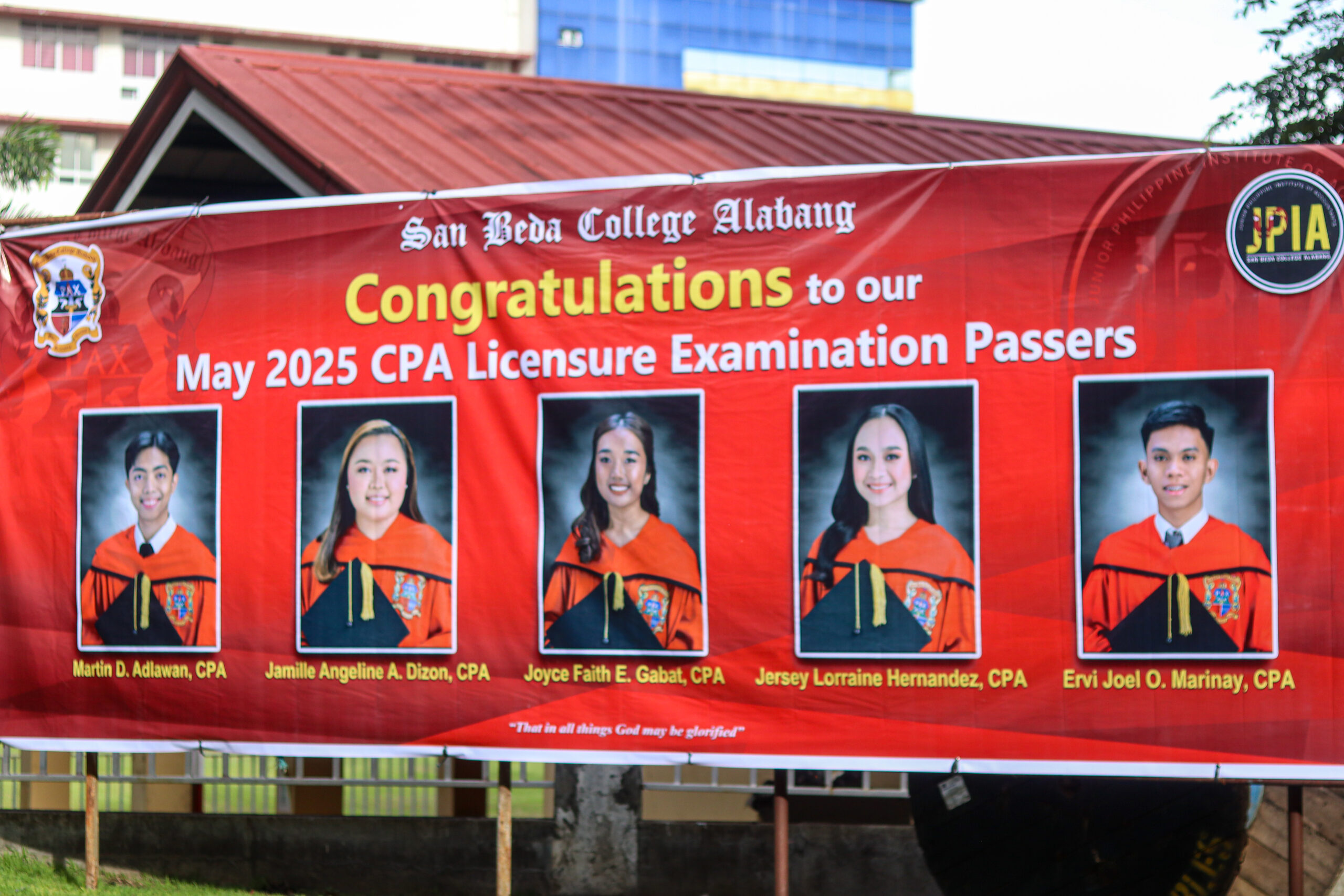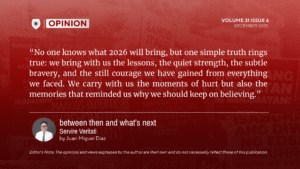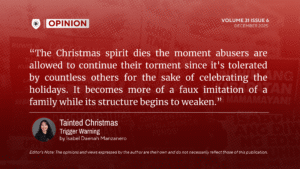Written By Luis Gabriel R. Santiago | October 28, 2025

Photographed By Kimi Simone A. Villena
Stories Behind the Title: Bedan CPAs honored in Testimonial Dinner
APPLAUDING the recent success of the new Bedan Certified Public Accountants (CPA) and board takers of the May 2025 Certified Public Accountant Licensure Examination (CPALE), the
SBCA Junior Philippine Institute of Accountants (JPIA) holds this year’s Testimonial Dinner to highlight the stories and struggles behind the sought-after CPA title. With the theme “Forged by Fire, A Celebration of Triumph,” the dinner was held last Oct. 18 at the Manny Reyes Hall.
Achieving a 55.56 percent passing rate, five Bedans, namely, Martin D. Adlawan, CPA, Ervi Joel O. Marinay, CPA, Jamille Angeline A. Dizon, CPA, Joyce Faith E. Gabat, CPA, and Jersey Lorraine Hernandez, CPA, successfully attained their CPA titles in this year’s May CPALE.
“Mag-Accountancy ka, pirma pirma lang ‘yan, yayaman ka na,” were the first words of the first guest speaker, Adlawan, as he looked back, referencing the advice he received from his uncle. “Lumulutang,” this was how Adlawan described the entirety of his college life, sharing how every semester was filled with fear of being “evicted” from the program and his struggles while failing his review and synthesis subjects.
Despite his preparations spanning months, he failed his first attempt at the licensure examination. “At that time, mapapa-isip ka talaga kung worth it ba siya,” he added. “I truly believe na ang board exam ay hindi lang intellectual, spiritual din,” noting that through the Benedictine motto Ora et Labora, Adlawan earned the license on his second take the following year.
Hernandez thanked her family first and foremost, sharing that their weekly “family time” was instrumental to her success. She thanked the pillars of her journey — her partner, professors, and friends — who she described as the “best support system I could ever have.”
“That one subject made me doubt my worth, my abilities, and whether this was really the path I wanted to take,” Marinay expressed, describing how difficult just the first year of the program was, before the switch to online modalities during his time at the college, while cautioning freshmen on the upcoming challenges ahead of them.
He admitted that his failure on his second try at the examination, scoring just a few points shy of the passing mark, was what broke him the most: “I felt lost. I gave everything: my time, my energy, my effort, and yet I still failed.”
“Maybe the third time’s a charm,” according to him, was the comment from his parents that urged him to retake the examination, eventually passing after years of failure. Ending his message were words that, despite being an average student, he was able to secure his title as CPA: “If I made it, why not you?”
Dizon, the final speaker for the night, emphasized that every story behind the CPA title is a story of struggle, faith, and perseverance. Graduating with a degree in Public Administration from the University of the Philippines Diliman in 2019, Dizon worked for some time before the pandemic struck. Shifting to online setups, the thought, “what if mag-aral ulit ako?” crossed her mind, leading to her enrolling in SBCA and beginning her journey towards being an accountant.
Working full-time as a professional while being a student, Dizon was overwhelmed and struggled to balance both. “I knew I had shortcomings. I didn't have the same time or focus that a full-time student has. For a normal student who ends their classes at 5 pm, I will be preparing to set up my office laptop and work. By 11 pm, some will be done studying and will be sleeping, while I, on the other hand, has to work until four in the morning.”
This struggle led her to quit her job entirely, considering it a necessary sacrifice to claim the title.
From her standpoint, she emphasized how the relationships she formed during her academic struggles were the same relationships that led to her success: “What started as shared confusion eventually became shared perseverance,” she shared.
During her first take, she treated it as “try lang,” yet claimed that the failure still hurt. On her second, she claimed that there was nothing wrong, simply needing that additional push and preparation before seeing her name on the list of passers. “Every sleepless night, every failure, every tear, it was all worth it; it was ten years in the making,” she ended before extending her thanks to everyone who was with her on her journey.
“We heard stories of resilience, struggles, and everything, and that's the reason why it is very important that we go back to the basics, the basic values that were taught to you by our alma mater,” Dr. Andres Ignacio C. San Mateo, Jr., Dean of the School of Business, Accountancy, and Management (SBAM), said in his closing remarks, reminding the new Bedan CPAs to remain grounded while challenging them to use their newly acquired license to be of service to their fellow Filipinos in light of the current issues of corruption surrounding the government.
“The event highlights not only their achievements but the perseverance, love, and support it took for them to get to where they are now,” said Mikaela Angela Tirol (II-BSA), JPIA VP for External Affairs, when asked about the idea of holding the testimonial dinner. She notes that despite the difficulty of the examination, it is possible through the formation of competence and character.
“It gives future Bedan CPAs a glimpse of what they can look forward to when they pass their CPA licensure exam. It inspires all students (not just the future CPALE takers) to excel, but if ever they don't, it reminds them to have the courage and humility to try again,” she added.
In the context of Philippine politics, it is a sickness lingering in the shadows of democracy. Looking at the national government, we have a few well-known groups — the Duterte Diehard Supporters (DDS), the Kakampinks (supporters of former Vice President Leni Robredo), and the Solid Marcos (supporters of the current administration). Subgroups include the Romuladez fanbase and the Sotto fanbase (thanks to the vocal Mayor Vico Sotto and the recent election of Senate President “Tito” Sotto III). Where do you belong? What’s your clique? What’s your cult?
Looking at history, this culture of fanaticism can be traced back to the colonial Philippines, where loyalty to the friars and the elites was essential to survival. It was deeply embedded in the structures of loyalty and power, under the guise of religion as imposed by Spanish colonizers. To further perpetuate this system, religion was used as a tool to push forward the idea of fanaticism, as faith and authority intertwined.
This eventually transformed into patronage politics, where support is nurtured using gifts, favors, or benefits instead of genuine service to the people. In an article, I read that in today’s time, fanaticism is rooted in Filipinos’ deep desire for certainty in times of uncertainty. People choose to believe in empty words of leaders, just because they idolize them, failing to see the cracks behind the service they give.
It is further compounded by today’s digital landscape. In social media, armies, trolls, and online defenders of various political families attack anyone who criticizes their political idol, which also leads to the continuous perpetuation of misinformation. One click is all it takes to see this playout. No one is safe from these attacks — whether you may be a lawyer, bishop, activist, or just a simple concerned citizen. Rational thinking of Filipinos fades as cult-like worship ensues. In a playing field such as this, truth and facts no longer hold weight, only loyalty does.
This culture of fanaticism has cultivated a cult of politics, one where our society is divided into different groups based on who you idolize. Fanaticism converts Filipinos to believers of political families and individuals rather than placing trust in the system. This fostered a culture of loyalty, turning citizens into blind cheerleaders rather than staunch critics demanding better governance and service. From mere participants, people are turned into pawns and pets of our very own democratic process. Fanaticism opens doors of opportunities, perpetuating corruption and abuse to flourish as it shrouds itself under the guise of “utang na loob” and popularity politics.
Just last Oct. 18, on the anniversary of the Jesus Is Lord Church, Worldwide founder and lawmaker Eddie Villanueva, father of Senate Minority Leader Joel Villanueva who has been linked to the corruption scandal, defended his son in front of the church’s religious followers. I’m not saying that they are a cult, but these tendencies wherein platforms are used to clear a politician's name, what more your son’s name, create and foster fanaticism among them.
Due to the ingrained culture of fanaticism, Filipinos choose to defend the lies of a politician even though they are confronted with the truth. Government leaders are treated like saints and gods — infallible from committing mistakes, untouchable from the masses, blameless and upright. The thing is, politicians are not saints, they are public servants — elected officials expected to exercise the functions of their office. People who must and should be held accountable when needed.
Political fanaticism kills accountability, especially when its followers fail to criticize their own idols, corruption and accountability run rampant. Justice becomes selective, as power is concentrated in certain families — keeping Filipinos divided. Loyalty is shifted from the nation to people and idols.
Truth be told, people's blind devotion has weakened the ideals and very essence of democracy. We place our trust in idols, families, and politicians despite their continuous streak of failures. Truth now becomes negotiable. Discourse is now toxic. Mediocrity of public service became the new norm.
One hopeful Filipino may ask, how can change truly happen?
Filipinos must be honest to accept this existing culture of fanaticism existing for decades within the country. We must be ready to reject our idols, hold people accountable, and put our loyalty not on people but on our country.
Revolution and change start only when we reject political fanaticism intertwined within the political fabric of our nation. Patriotism does not equate to blind loyalty. Real love for the country is when Filipinos are able to freely speak up, criticize, and denounce — even against the people they once voted for.
After all, Filipinos deserve citizens loyal to the country, not fanatics devoted to idols.
Volume 31 | Issue 4



